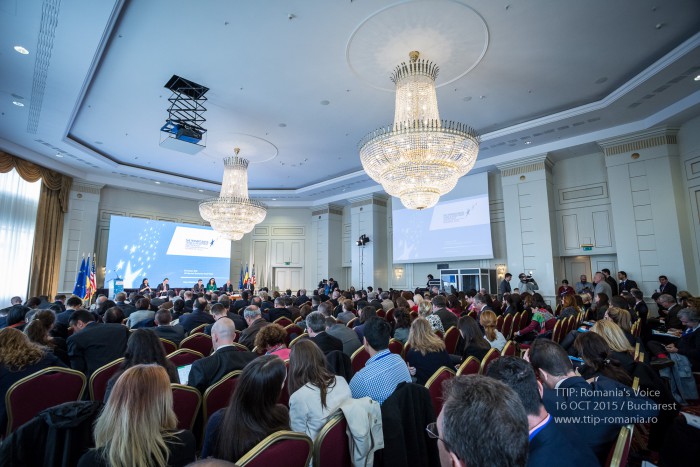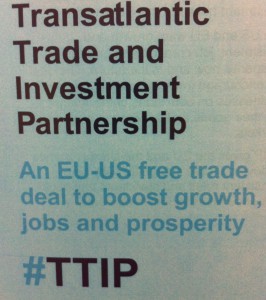28th October 2015
The Transatlantic Trade and Investment Partnership (TTIP): Romania’s Voice

 I attended earlier this month in Bucharest a conference entitled “TTIP: Romania’s Voice”. It was organised by a Romanian member of the European Parliament named Sorin Moisa, and incorporated the outcome of an interesting national consultation exercise sounding out the views of Romanian businesses towards TTIP. It also provided the opportunity to listen to an impressive line-up of speakers assembled for the event; among them Cecilia Malmstrom, the European Commissioner for Trade; Bogdan Aurescu, Romanian Foreign Minister; Tony Gardner, the US Ambassador to the EU, and, I am delighted to say, Chris Barton, the Director of International Trade at the UK’s Department for Business, Innovation and Skills.
I attended earlier this month in Bucharest a conference entitled “TTIP: Romania’s Voice”. It was organised by a Romanian member of the European Parliament named Sorin Moisa, and incorporated the outcome of an interesting national consultation exercise sounding out the views of Romanian businesses towards TTIP. It also provided the opportunity to listen to an impressive line-up of speakers assembled for the event; among them Cecilia Malmstrom, the European Commissioner for Trade; Bogdan Aurescu, Romanian Foreign Minister; Tony Gardner, the US Ambassador to the EU, and, I am delighted to say, Chris Barton, the Director of International Trade at the UK’s Department for Business, Innovation and Skills.
Three important sets of arguments for TTIP were explored at the conference: economic, strategic and EU reform. The economic case of course took centre stage. The UK believes that a successful TTIP could eventually boost the UK economy by as much as £10 billion a year, and the EU economy by up to £100 billion. This is a huge opportunity for growth and for jobs. A study by the European Commission’s chief trade economist, Lucian Cernat, together with Csilla Lakatos, predicts that TTIP could be responsible for a 0.25% growth in Romania’s GDP. While the United States is not currently one of Romania’s top trading partners, and some studies suggest that Romania is not among those EU member states likely to derive the greatest initial benefit from TTIP, this kind of boost would nonetheless be hugely welcome for the Romanian economy.
Some of this economic benefit will come from tariff reductions. While tariffs are already relatively low in most sectors, they are still a significant challenge for exporters, and Sorin Moisa’s consultation identified major opportunities for Romanian exporters in such sectors as footwear and ceramics. But the research by Cernat and Lakatos estimates that 93% of the economic benefit for Romania from TTIP will come not from tariff cuts but from the dismantling of non-tariff barriers. Reduced regulatory burdens, smoother customs processes and access to US public procurement markets will help EU firms both large and small.
Speakers at the conference also highlighted the strategic case for TTIP, an agreement which will bring a new dynamic into the EU/US relationship, already close, bringing together two partners with many shared values. Foreign Minister Aurescu highlighted the importance of Romania’s strategic partnership with the USA in making the case for TTIP.
A third line of argument developed at the conference was the EU reform case for TTIP. Chris Barton noted that TTIP would serve as a great example of an EU delivering real benefits for its citizens: a dynamic, competitive and outward-facing union.
In many ways the most powerful testimony at the event came though from those Romanian companies already doing business with the USA, or exploring the opportunities to do so, who saw the advantages that TTIP could bring to them in enabling them to grow their transatlantic exports further. These came from such firms as Antibiotice, a Iasi-based pharmaceuticals manufacturer; Senator Wine, an exporter of wines made from traditional Romanian grape varieties; and Romina Furniture, already successfully exporting its high-end children’s bedroom furniture to the USA.
Offering benefits for both businesses and consumers, a TTIP deal would boost growth, jobs and prosperity. There are complex negotiations ahead, but the potential gains for all involved in them are considerable.